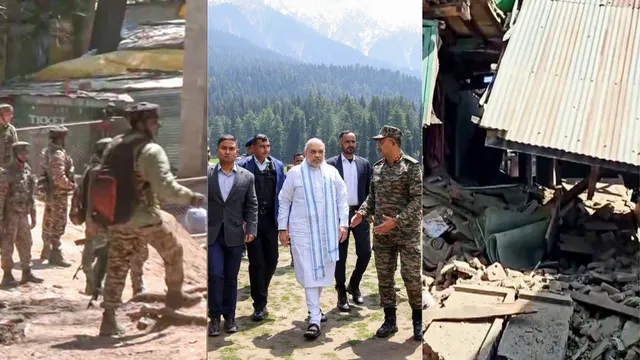- By Talibuddin Khan
- Sat, 26 Apr 2025 06:41 PM (IST)
- Source:JND
Pahalgam Attack: The barbaric attack on tourists in Kashmir's Pahalgam on April 22 has sent shockwaves across the nation with people from all strata of the society condemning the brutality. 26 people, mostly tourists from other states, were gunned down by a group of 7-10 terrorists while they were enjoying the scenic beauty of the Baisaran Valley in Pahalgam. This is one of the most brutal attacks on civilians, especially tourists, in Jammu and Kashmir in about two decades.
Following the ghastly attack, security forces in Jammu and Kashmir have launched a massive crackdown on terrorists and their sympathisers, razing the homes of suspected terrorists, raiding their safe havens and hideouts and detaining hundreds for questioning.
Homes of at least five terrorists, including the that of Pahalgam attack's prime suspect, have been demolished by the authorities in the past 48 hours with officials saying similar action will be taken against others involved in terror activities.
The security forces are going after the known terrorist associates and their sympathisers across the length and breadth of the Valley, to create a deterrent against any Pahalgam-like attacks.
Mysterious blasts blew up the houses of two active terrorists -- Aadil Thoker in the Bijbehara area of Anantnag district and Asif Sheikh in the Tral area of Pulwama district. While Thoker has been named as one of the three terrorists involved in the gruesome killing of tourists in Pahalgam, Sheikh's involvement in the attack has also not been ruled out.
Hundreds of overground workers (OWGs) and their supporters have also been detained, mainly in four south Kashmir districts, in a bid to track down the terrorists who carried out the Pahalgam attack on Tuesday. One alleged OWG was killed in firing by terrorists during one such operation in Bandipora district on Friday.
On Saturday, the action shifted to Srinagar where raids were carried out at more than a dozen places, including Safakadal, Soura, Pandach Bemina, Shalteng, Lal Bazar and Zadibal areas. In Anantnag district, search operations are being carried out round-the-clock as security forces step up vigilance. Mobile vehicle check-points have been put up across the district to monitor any suspicious movement.
India's Actions After Pahalgam Attack:
In the wake of the devastating terrorist attack, India has implemented a series of stringent measures against Pakistan, citing the alleged cross-border involvement of Pakistan in the assault.
India on Wednesday announced the suspension of the 1960 Indus Waters Treaty, a pivotal agreement that governs the sharing of river waters between the two nations. Union Jal Shakti Minister CR Paatil declared that the government is formulating a comprehensive plan to halt the flow of Indian river water into Pakistan, encompassing immediate, medium-term, and long-term strategies.
In addition to the treaty suspension, India also closed the Attari-Wagah land border crossing, effectively halting overland movement between the countries. Pakistani military attaches have also been expelledand the diplomatic staff at the Pakistani High Commission in New Delhi has also been reduced to 30 members. India has also revoked all existing visas issued to Pakistani nationals and instructed those who entered India via the Attari border to depart by May 1.
Pahalgam Attack: Pakistan’s Countermeasures
In retaliation, Pakistan has Closed its airspace to all Indian-owned or operated airlines, disrupting air travel between the two nations. All trade with India, including transactions conducted through third countries, has also been suspended by Pakistan. Furthermore, Pakistan’s Senate unanimously passed a resolution condemning India’s accusations and reaffirming the nation’s readiness to defend its sovereignty.

